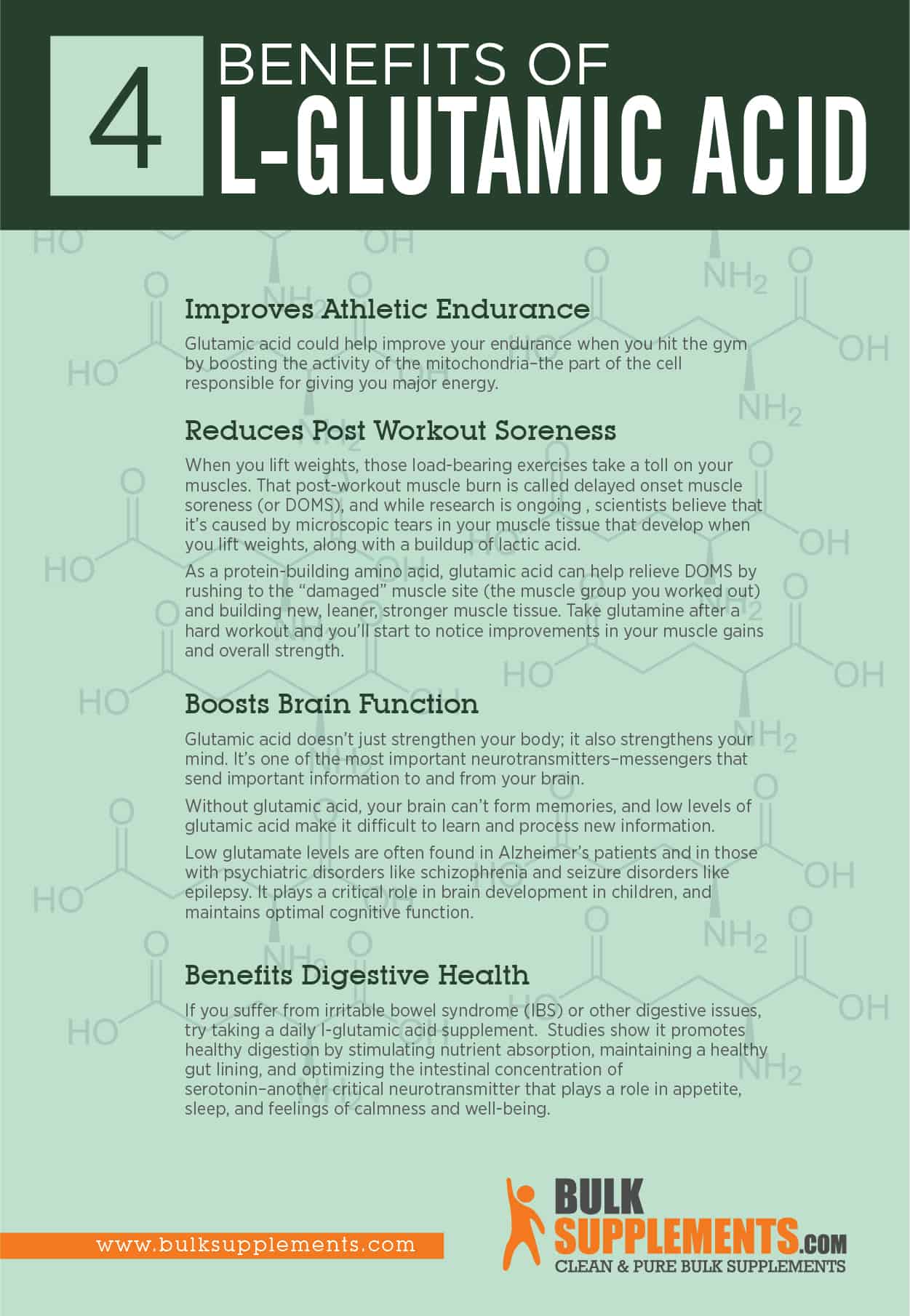L-Glutamic Acid: Benefits, Dosage & Side Effects
by James Denlinger Digital Marketing StrategistL-glutamic acid is a staple in many preworkout blends. But it doesn’t just kick your workout up a notch (or twenty). It boasts multiple health benefits and could help with everything from your fitness to your digestion and brain function.
So is L-glutamic acid the right choice for you? First, let’s start with some basics:
What is L-Glutamic Acid?
L-glutamic acid — or simply glutamic acid — is an amino acid that the body produces naturally. It’s also called glutamate. Many people choose to take l-glutamic acid supplements, but it’s possible to get all the glutamic acid you need from food.
Amino acids are the building blocks of protein. There are more than 20 different kinds of amino acids, broken into two groups: essential and nonessential amino acids. Glutamic acid is a nonessential amino acid, which means that your body makes enough of it on its own.
Glutamic Acid Benefits
Improves Athletic Endurance
Glutamic acid could help improve your endurance when you hit the gym by boosting the activity of the mitochondria–the part of the cell responsible for giving you major energy.
Reduces Post Workout Soreness
When you lift weights, those load-bearing exercises take a toll on your muscles. That post-workout muscle burn is called delayed onset muscle soreness (or DOMS), and while research is ongoing , scientists believe that it’s caused by microscopic tears in your muscle tissue that develop when you lift weights, along with a buildup of lactic acid.
As a protein-building amino acid, glutamic acid can help relieve DOMS by rushing to the “damaged” muscle site (the muscle group you worked out) and building new, leaner, stronger muscle tissue. Take glutamine after a hard workout and you’ll start to notice improvements in your muscle gains and overall strength.
Boosts Brain Function
Glutamic acid doesn’t just strengthen your body; it also strengthens your mind. It’s one of the most important neurotransmitters–messengers that send important information to and from your brain.
Without glutamic acid, your brain can’t form memories, and low levels of glutamic acid make it difficult to learn and process new information.
Low glutamate levels are often found in Alzheimer’s patients and in those with psychiatric disorders like schizophrenia and seizure disorders like epilepsy. It plays a critical role in brain development in children, and maintains optimal cognitive function.
Benefits Digestive Health
If you suffer from irritable bowel syndrome (IBS) or other digestive issues, try taking a daily l-glutamic acid supplement. Studies show it promotes healthy digestion by stimulating nutrient absorption, maintaining a healthy gut lining, and optimizing the intestinal concentration of serotonin–another critical neurotransmitter that plays a role in appetite, sleep, and feelings of calmness and well-being.
 PIN IT
PIN ITFood Sources of Glutamic Acid
Foods rich in glutamic acid include:
- Green beans
- Milk
- Eggs
- Turkey
- Seafood
- Nuts
- Asparagus
- Yogurt
- Cabbage
- Bone broth
- Broccoli
- Tofu
- White rice
- Organic poultry
- Corn
Glutamic Acid Side Effects and Dosage
You can generally find glutamate supplements available as l-glutamic acid powder. If you opt for this form, take 4000 milligrams once a day, or as otherwise directed by a physician.
Glutamic acid HCL powder is another popular glutamate supplement. It contains hydrochloric acid (HCL) to help it dissolve in liquids and to ease digestion.
Side Effects
Glutamic acid is generally safe for children between the ages of 3-18 years old who take it by mouth. Doses for children should never exceed more that 0.7 g per kilogram of weight each day. Talk to a pediatrician before giving your child glutamic acid.
Talk to your doctor before taking glutamic acid if you are nursing or pregnant. Do not take glutamic acid if you have a history of liver or kidney disease, or if you have a neurological condition like epilepsy, as glutamic acid could worsen these conditions.
The Bottom Line
As one of the body’s most important amino acids and neurotransmitters, glutamic acid benefits everything from your workout performance to your memory. And if you suffer from chronic digestive issues, it could help soothe symptoms like cramping, indigestion, and more.
While your body makes enough glutamic acid on its own, adding a supplement to your nutrition regimen ensures you’re getting the extra support you need to optimize your overall wellness.
Sponsor Ads
Created on Apr 15th 2020 11:49. Viewed 364 times.




